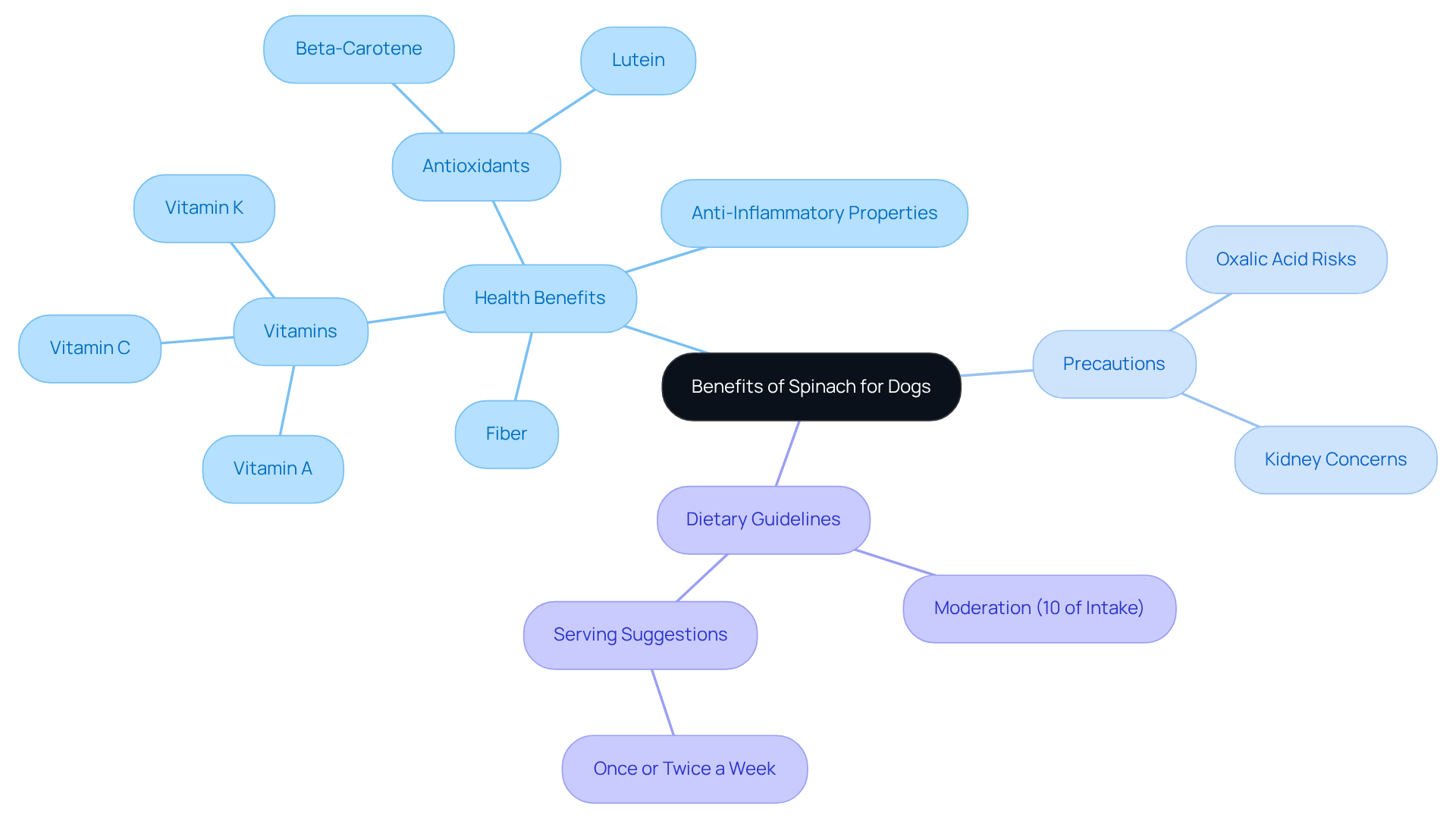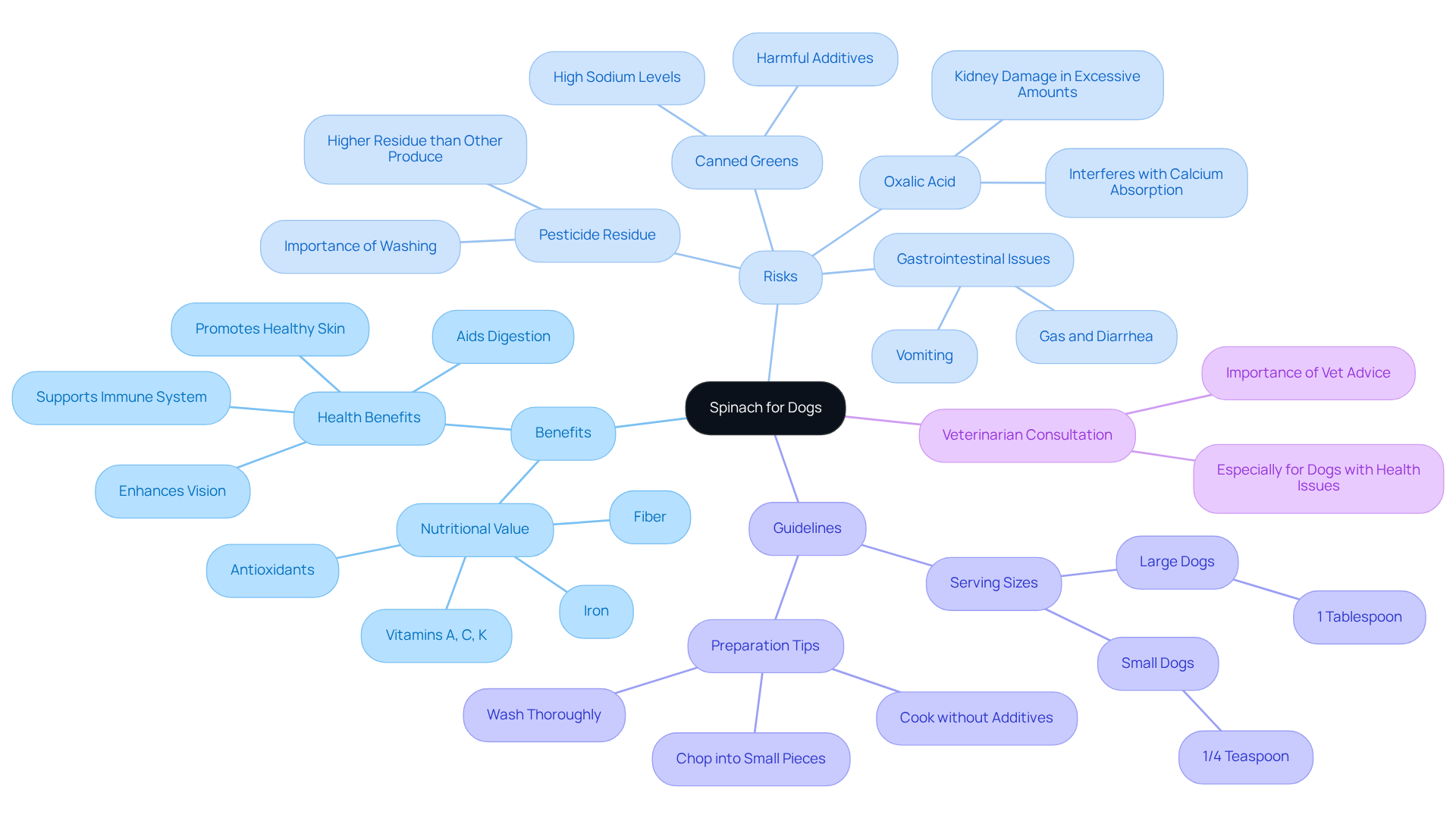Understanding Spinach for Dogs: Benefits, Risks, and Guidelines
Overview
As a loving pet owner, you want the best for your furry family members, and spinach can offer several health benefits for dogs. Packed with essential vitamins and antioxidants, it supports immune function and aids digestion. However, it’s important to remember that spinach should be given in moderation due to its high oxalic acid content. This can interfere with calcium absorption and may pose risks for dogs with kidney issues.
Before introducing spinach into your dog’s diet, we encourage you to consult with a veterinarian. This ensures that you are making the best choice for your pet’s health. Serving spinach in small portions can help maximize its benefits while minimizing any potential risks. By taking these steps, you can create a nurturing environment for your beloved companion, ensuring they thrive and enjoy a balanced diet.
Introduction
The vibrant green leaves of spinach, often celebrated for their health benefits in human diets, can also offer a nutritious boost for your furry family members. Packed with essential vitamins and minerals, this leafy green has the potential to enhance canine health. However, as a caring pet owner, it’s important to tread carefully.
What are the real benefits of adding spinach to your dog’s diet, and what risks should you consider? Understanding the delicate balance of incorporating this superfood safely is crucial for ensuring the well-being of your beloved companions.
Define Spinach: Characteristics and Nutritional Profile
Spinach for dogs is a nutrient-dense leafy green vegetable that your furry family members can truly benefit from. With only 7 calories per cup, it’s low in calories yet brimming with essential vitamins and minerals, including vitamins A, C, K, and several B vitamins, along with iron and calcium. Comprising about 91% water, this leafy green is not only hydrating but also contains dietary fiber that supports healthy digestion. Its vibrant green hue signals the presence of carotenoids, which contribute to overall health benefits for your beloved pets.
Notably, spinach for dogs is an excellent source of iron, which is crucial for maintaining a healthy circulatory system in dogs, as it aids in red blood cell production and oxygen transport. Furthermore, the antioxidants and phytonutrients found in leafy greens may assist in cancer prevention for both humans and animals, making it a beneficial addition to a balanced diet. However, it’s important for pet owners to be aware of the oxalic acid content in spinach, which can hinder calcium absorption and potentially lead to kidney problems if ingested in large amounts. Therefore, incorporating this leafy green in small amounts is advisable to maximize its health benefits while minimizing risks.
Historically, spinach has been cultivated for centuries, and its introduction to various regions has contributed to its popularity. As a testament to its health advantages, one expert noted, ‘Spinach is filled with nutrients A, B, C, and K,’ emphasizing its nutritional importance for pets. So, consider adding a little spinach for dogs to your pet’s diet—your furry family members will thank you for it!

Explore the Benefits of Spinach for Dogs
Including spinach for dogs in their diet in moderation can offer a wealth of health benefits for your furry family members. This leafy green is rich in essential vitamins A, C, and K, which play vital roles in supporting immune function, enhancing vision, and aiding blood clotting. Additionally, the antioxidants found in leafy greens, such as lutein and beta-carotene, are particularly effective at combating oxidative stress, potentially lowering the risk of chronic illnesses like cancer and heart problems.
Moreover, the fiber content in leafy greens supports healthy digestion and contributes to a well-functioning gut. Research suggests that the anti-inflammatory properties of spinach for dogs may help alleviate discomfort associated with conditions like arthritis, making it a valuable addition to their diet when prepared properly. However, it’s essential to remember that spinach contains high levels of oxalic acid, which can hinder calcium absorption and lead to kidney damage if consumed in excess.
To ensure your dog’s well-being, you should limit spinach for dogs to no more than 10% of their daily food intake. To maximize its benefits, serve it in small portions, ideally once or twice a week, and always introduce it gradually to monitor for any adverse reactions. If your canine companion is prone to kidney or bladder stones, it’s best to avoid leafy greens altogether. Always consult with your veterinarian before incorporating spinach for dogs into your dog’s diet, ensuring a nurturing environment for your beloved pet.

Understand the Risks of Spinach for Dogs
Including spinach for dogs can be a nutritious addition to your pet’s diet, but it’s important to be aware of both its benefits and potential risks. While it offers various health advantages, its high oxalic acid content can interfere with calcium absorption and, if consumed in excessive amounts, may lead to kidney damage. For dogs with existing kidney issues or those prone to urinary tract problems, it’s best to completely avoid spinach for dogs for their well-being.
Moreover, when considering spinach for dogs, it tends to have more pesticide residue than any other fresh produce, making thorough washing essential before feeding it to your furry family members. Canned greens should also be avoided due to elevated sodium levels and additives that can be harmful to canines. Introducing spinach for dogs too quickly or in large quantities can lead to gastrointestinal distress, which may manifest as gas, diarrhea, or vomiting.
To ensure a safe introduction, recommended serving sizes range from:
- 1/4 teaspoon for smaller dogs
- 1 tablespoon for larger dogs
Moderation is key to keeping your pet healthy and happy, which includes the appropriate use of spinach for dogs. We highly encourage pet owners to consult a veterinarian before adding greens to their dog’s meals, ensuring that every decision made supports a nurturing environment for your beloved companions.

Incorporate Spinach Safely: Guidelines for Pet Owners
Incorporating leafy greens into your dog’s diet can be a wonderful way to enhance their nutrition, but it’s important to do so safely. Start by introducing small amounts—typically one to three tablespoons of cooked greens—adjusted for your furry family member’s size. Steaming leafy greens not only enhances their digestibility but also reduces oxalic acid content, which can hinder calcium absorption. For instance, spinach is packed with vitamins A, B, C, and K, all of which contribute to your dog’s overall health.
To keep your pet safe, remember to:
- Chop the leafy greens into small pieces to prevent choking hazards.
- Thoroughly rinse the greens to eliminate any pesticide exposure.
As you introduce these new foods, observe your dog for any negative responses, such as gastrointestinal distress. Consulting your veterinarian before adding greens to your dog’s diet is always a wise choice, especially since some dogs may have allergies to them.
Lastly, keep in mind that spinach should be considered an occasional treat rather than a dietary staple. This approach ensures that your dog’s overall nutrition remains balanced and healthy, creating a nurturing environment for your beloved pet.

Conclusion
Incorporating spinach into your dog’s diet can provide numerous health benefits, especially when approached with care and moderation. This nutrient-packed leafy green is rich in essential vitamins and minerals that support your furry family member’s overall health, including:
- Immune function
- Digestion
- Potential cancer prevention
However, it’s important to remain vigilant about the risks associated with spinach, particularly its oxalic acid content, which can interfere with calcium absorption and pose kidney health concerns if consumed excessively.
As you consider introducing spinach, remember the key point: moderation is essential. Proper preparation is crucial—thoroughly wash the greens and cook them to reduce oxalic acid levels. It’s also vital to adhere to safe serving sizes and consult with your veterinarian before adding spinach to your dog’s meals, especially for those with pre-existing health issues.
Ultimately, understanding the balance between the benefits and risks of spinach for dogs is vital for nurturing a healthy diet. By following these guidelines, you can make informed decisions that enhance your dog’s nutrition while ensuring their safety. Embracing this knowledge empowers you to cultivate a nurturing environment, allowing your beloved pets to thrive with the right dietary choices.
Frequently Asked Questions
What is spinach, and why is it beneficial for dogs?
Spinach is a nutrient-dense leafy green vegetable that offers numerous health benefits for dogs. It is low in calories (only 7 calories per cup) and packed with essential vitamins and minerals, including vitamins A, C, K, iron, and calcium.
What are the main nutrients found in spinach?
Spinach contains vitamins A, C, K, several B vitamins, iron, calcium, and is composed of about 91% water. It also includes dietary fiber that supports healthy digestion.
How does spinach support a dog’s health?
Spinach is an excellent source of iron, which is important for maintaining a healthy circulatory system in dogs by aiding in red blood cell production and oxygen transport. Additionally, its antioxidants and phytonutrients may help in cancer prevention.
Are there any risks associated with feeding spinach to dogs?
Yes, spinach contains oxalic acid, which can hinder calcium absorption and potentially lead to kidney problems if consumed in large amounts. It is advisable to incorporate spinach in small amounts to maximize health benefits while minimizing risks.
How should spinach be incorporated into a dog’s diet?
Spinach can be added to a dog’s diet in small amounts to ensure the health benefits are enjoyed without the associated risks of excessive oxalic acid intake.
What historical significance does spinach have?
Spinach has been cultivated for centuries and has gained popularity due to its numerous health advantages, making it a well-regarded addition to both human and pet diets.







